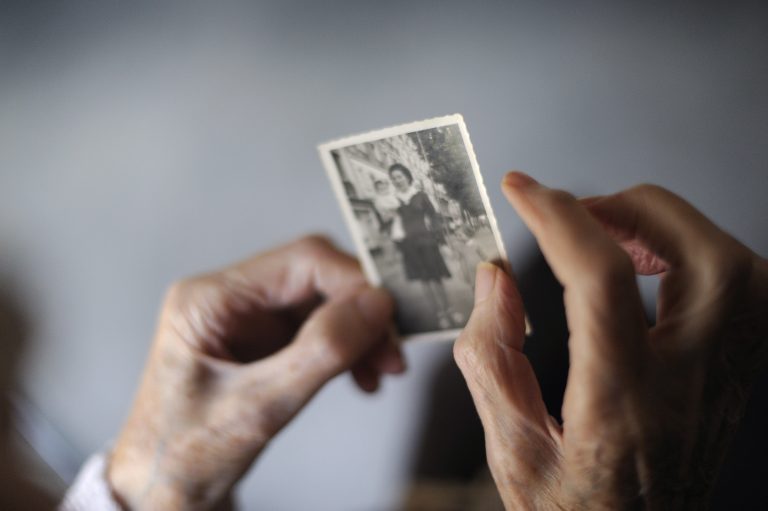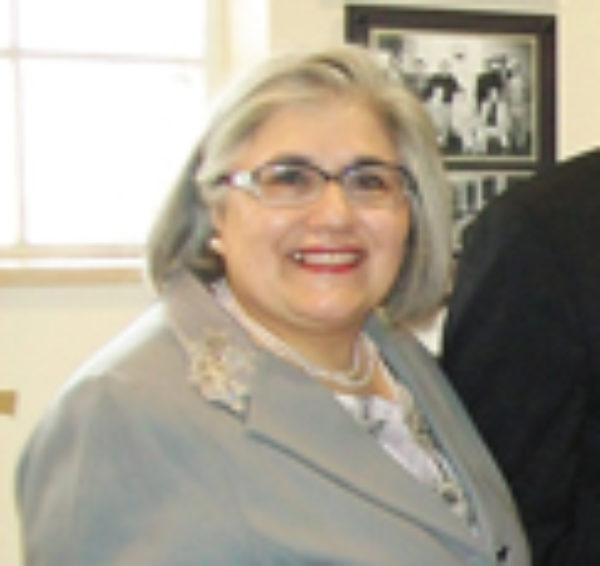
A woman, suffering from Alzheimer's disease looks at an picture of herself while living in a retirement house in eastern France. Image by Sebastien Bozon/Agence France-Presse / Getty Images, © All Rights Reserved.
No Mourning, No Pieta, No Tears: Waiting for the Final Death
“There’s something wrong with Mother,” I said to my two brothers and my sister. “It’s Alzheimer’s or dementia. She is out of her mind.”
“She just doesn’t talk much any more.”
“She never did answer a question directly.”
“She’s OK. She’s not harming anyone or setting fire to the house.”
These were the answers my two brothers and my sister gave me when I would bring up the topic of dementia or Alzheimer’s disease. No one wanted to think that a family member could be, well, out of her mind.
But she was. I knew for years she had some form of dementia, but no one would believe me. She accused my father of replacing her dishwasher with one he found in the dump one time. And then she phoned me to give the serial number from the dishwasher and find out when it was made so she could confront him with replacing what she thought was her new dishwasher with an old, discarded one.
I lost it during that phone call. I told her she was crazy and hung up on her. I didn’t speak to her for months after that. I was angry that my mother had left and in her place was this woman who talked nonsense and would not be deterred. She wore the same clothes day in and day out — a cotton housecoat over long underwear, grey work socks, and running shoes. She wore them during the day and slept in them at night. Once a week she asked for a bath, and my father would lift her in and out of the tub. He was 90 years old. She was 86.
At that point, one of my brothers spoke to her family doctor and had her assessed. The doctor was able to admit her to Sudbury General Hospital “for tests.” From there, she was moved into a nursing home where she would die seven years later.

The hospital was the first of her three deaths.
When I visited her there, I saw a slack-jawed woman who stared vacantly ahead and had few words left to her. I am not certain she knew who I was when I was alone with her. I asked if she wanted me to put on the TV so she could watch the news, which was something she used to enjoy. She shook her head and said she could not do that.
“I can’t do anything. I just can’t,” she said, “That’s all I can do.” I sat beside her bed and saw a stranger and realized I had fallen asleep. While I was asleep, something had happened. The woman I knew who cooked three meals a day, who sewed all my clothes as a young girl and then taught me to sew, who polished hardwood floors on her hands and knees, who served as sacristan at our church — ironing fair linen and polishing chalices — who still put clothes out to dry on a clothesline and ironed sheets, who preserved vegetables from the garden — that woman was gone. In her place was another who had vacant eyes and hands that fell uselessly by her side and were empty of all occupation and all strength and all purpose. The woman I knew as my mother was gone.
When I look back on this moment, I see her hands open with the relief of having no more work to do, no more need to meet the expectations of others, no more obligations. The burden of her life was lifted and, in the confusion of her mind, she was right. There was nothing for her to do any more. Her sword had outworn its sheath and her soul had outworn itself. It was as though she had fallen into clear, deep water and was moving away from me — falling, falling, sinking out of reach. And I watched her sink deeper, knowing she was beyond reach.
The next death came when my brothers convinced my father to sell the family home and move into a seniors residence. My brothers left it to me to clean out her things from the house, and I did. Everything went to one of three places: to charity shops, to my father’s apartment, and to the dump. One dress, one pair of shoes, and some jewelry I saved to dress her for her coffin.
What remained was the emptiness, the echoing of absence and silence. I looked at her empty closet and it was like the empty tomb at Easter. She was not here. But if she was no longer here, then where?

When I visited her in the nursing home, there was nothing there. Nothing left. She reminded me of a long-dead June bug I found in my basement. The carapace was there, but nothing inside. No conversation. No recognition. No response of any kind. With dementia, there are no good-byes or last visits. It’s a gradual and steady attenuation, dissolving and finally a fading to that final silence.
She had moved beyond reach. Now she moved beyond voice and speech and sound. And we waited for the final silence. And we waited for the final death.
I was working late that day and my brother, Jim, called me at work to tell me she had died. “Thank God,” I said. “It’s over.” He quietly agreed with me. All I felt at her passing was relief — not love or grief or pain at her departure from this life but relief that the waiting was finished and that final silence had come.
I told him where the coffin outfit was. At her funeral, I read Proverbs 31: 10-31 – “Ode to a Capable Wife.” I owed that much to the mother who left to have her remembered as capable and with a price above rubies and not as that empty carapace.

In two of the synoptic gospels, Jesus goes with his disciples to a place called Gethsemane and tells them to sit and stay awake while he withdraws a bit from them to pray. As we all know, the disciples fall asleep and are subsequently rebuked by a disappointed Jesus for doing so. But the rebuke does not forestall or change the outcome of the inevitable. As an adult child — the youngest in the family and one of two daughters who had little to do with her ongoing care — my role was to wait with her and watch. Somewhere in that period that was her Gethsemane, I confess that I fell asleep. I could not do the vigil.
There was no mourning, no pieta, no tears. Just relief. It was simply the end of the story when love cannot breach the chasm, when all that is left is the waiting for what must come. My mother’s Gethsemane was a long one and I am now convinced that we all must face our own Gesthemanes — when we are truly alone and walk that last path beyond the reach of others who can only wait. Those who wait, wait not for a return but for the inevitable and for the relief that comes with it.
